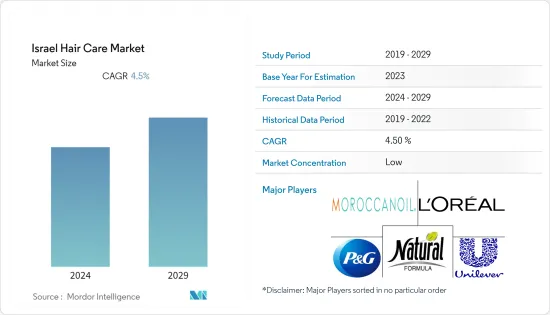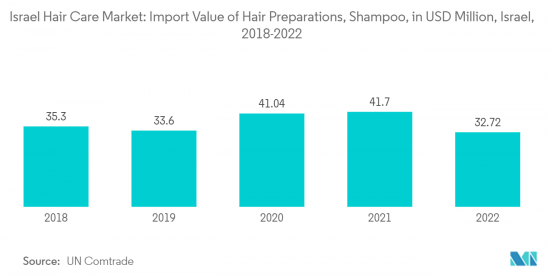PUBLISHER: Mordor Intelligence | PRODUCT CODE: 1404074

PUBLISHER: Mordor Intelligence | PRODUCT CODE: 1404074
Israel Hair Care - Market Share Analysis, Industry Trends & Statistics, Growth Forecasts 2024 - 2029

The Israel hair care market size is expected to grow from USD 400.26 million in 2024 to USD 498.79 million by 2029, at a CAGR of 4.50% during the forecast period (2024-2029).
Key Highlights
- Arid weather, high sun exposure, and other factors are leading to a decrease in hair longevity, and urbanized Israelites are increasingly looking for alternatives to fix problems like hair thinning, hair loss, scalp problems, and more. Most Israeli consumers consider shampoos and conditioners necessities, whereas hair masks and oils are considered less essential. However, as the quality of life continues to rise in the country, and there is a growing awareness of masks and oils in hair care, Israelites are becoming more interested in these products.
- With a large section of the population witnessing hair loss and suffering from common hair problems, such as dandruff and hair fall, the usage of hair care products in the country is on the rise. The rising pollution level in the country is also expected to drive the need for hair products that are clinical and derived from natural ingredients.
- The sales of hair products through e-commerce channels are increasing nationwide, fueled by the predominately young and tech-savvy population. Israel offers lucrative opportunities to the players to explore omnichannel options. For instance, the International Trade Association 2022, Israel represents an excellent opportunity for online sellers of consumer goods, with an e-commerce penetration of 47%, representing 4 million consumers out of 9 million citizens in Israel. According to the International Trade Association, eCommerce users are expected to grow by 25% to 5 million users in Israel by 2025.
- The high-income disparity makes it impossible to manufacture higher value-added products for a large Israeli hair care market population. Tighter purse strings, in response to an austere economy and other factors, pose challenges for hair care in the Israeli market.
Israel Hair Care Market Trends
Growing Popularity of Private Label and Indigenous Brands
- The demand for hair care products in Israel is rising mainly due to an increase in the young and aspirational population who invest in grooming, appearance, and maintaining hair health. Another key trend in the market includes hair care products that comply with the halal law, which is also becoming a global trend.
- Moreover, the consumers in Israel prefer personalized products and services, further catalyzing the private-label and indigenous manufacturers to cater to this gap in the hair care industry and secure a position for themselves in the highly fragmented and intensely competitive industry.
- Private-label small and medium enterprises (SMEs) are significant contributors to key product innovations and market growth. Private label is now extending from staple categories, such as baby products, bath, shower, or oral care, to more premium categories, such as hair masks, hair color, and keratin-infused ranges. These factors have attracted multi-generational consumer groups in search of products offering a good balance between affordability and quality.
- The Israeli hair care market is thriving, and there has also been an increase in the import of hair care products, including shampoo and other such products. According to the UN Comtrade data, the import value of hair preparations and shampoo amounted to approximately USD 32.72 million in 2022.
- Furthermore, due to the popularity of private labels and indigenous brands, the products have also gained recognition in the international market. Some of Israel's popular hair care brands include Moroccanoil, La Beaute, My Way, and Pro Berry. According to the UN Comtrade data, the export value of hair preparations and shampoo rose from approximately USD 128 million in 2020 to USD 166.8 million in 2021.
- Therefore, the growing inclination toward private-label and indigenous beauty brands is expected to contribute significantly to the overall market growth during the forecast period.

Rising Scope For Online Retail Segment
- Due to the rise in internet penetration across the region and the popularity of online retail channels, many players have been offering their products via online retail stores. For instance, International Trade Association 2022, Israel represents an excellent opportunity for online sellers of consumer goods, with internet penetration of 97% in the country. The increased exposure to the internet led to the direction of a wide variety of hair care products and promotions for such products, propelling the market growth.
- The rising fashion trends among the young population, expanding distribution channels, and high purchasing power are the primary factors driving the hair styling products market in the region. The online retail segment for retail sales in Israel's hair care market is expected to grow fastest during the forecast period.
- \The online retail platform provides consumers with more comprehensive options and brands of hair care products, which is the key growth factor of the segment. Retailers increasingly use augmented reality (AR) technologies to help online customers and improve their e-commerce experience.
- With the improving logistics capabilities, faster delivery, and hassle-free returns, single and multi-brand retailers are making customers feel more at ease with online purchases, driving the beauty and personal care market through e-commerce. Moreover, several personal care online stores and e-commerce websites offer lucrative discounts for price-sensitive Israeli consumers, likely to drive sales via online retailers.
- Some popular e-commerce retailers selling hair care products in Israel are Wow Cosmetics, H&B, Cosmo Store, Israeli Products, Care To Beauty, Judaica web Store, and others. Notably, there has been a consistent rise in the number of internet users in Israel, which will likely improve online retail sales of hair care products in the future.
Israel Hair Care Industry Overview
The Israeli hair care market is competitive, with the presence of several global players in the market. The market also allows domestic players and private-label brands to grow in the forecast period. A few leading players in the market include Natural Formula, L'Oreal SA, The Procter & Gamble Company, Unilever PLC, and Moroccanoil Inc. The players operating in the market are introducing innovative products and new technologies to attract more customers.
Companies are increasing research and development (R&D) efforts and marketing to expand their regional presence. They are focusing on expanding their distribution network to reach the maximum number of customers. Companies are adopting marketing strategies by partnering with leading online retailers to reach customers instantly. Furthermore, the companies have also been using strategies such as expansion and partnerships to strengthen their presence in the market.
Additional Benefits:
- The market estimate (ME) sheet in Excel format
- 3 months of analyst support
TABLE OF CONTENTS
1 INTRODUCTION
- 1.1 Study Assumptions and Market Definition
- 1.2 Scope of the Study
2 RESEARCH METHODOLOGY
3 EXECUTIVE SUMMARY
4 MARKET DYNAMICS
- 4.1 Market Drivers
- 4.1.1 Popularity of Private Label and Indigenous Brands
- 4.1.2 Internet Penetration Proliferated the eCommerce Sales of Hair Care Products
- 4.2 Market Restraints
- 4.2.1 Counterfeiting In Hair Care Products
- 4.3 Industry Attractiveness - Porter's Five Forces Analysis
- 4.3.1 Threat of New Entrants
- 4.3.2 Bargaining Power of Buyers/Consumers
- 4.3.3 Bargaining Power of Suppliers
- 4.3.4 Threat of Substitute Products
- 4.3.5 Intensity of Competitive Rivalry
5 MARKET SEGMENTATION
- 5.1 Type
- 5.1.1 Shampoo
- 5.1.2 Conditioner
- 5.1.3 Hair Styling Products
- 5.1.4 Hair Colorants
- 5.1.5 Hair Oil & Hair Serum
- 5.1.6 Other Types
- 5.2 Distribution Channel
- 5.2.1 Supermarkets/Hypermarkets
- 5.2.2 Convenience Stores/Grocery Stores
- 5.2.3 Pharmacies/Drug Stores
- 5.2.4 Online Retail Stores
- 5.2.5 Specialty Stores
- 5.2.6 Other Distribution Channels
6 COMPETITIVE LANDSCAPE
- 6.1 Most Adopted Strategies
- 6.2 Market Share Analysis
- 6.3 Company Profiles
- 6.3.1 Natural Formula
- 6.3.2 L'Oreal S.A.
- 6.3.3 The Procter & Gamble Company
- 6.3.4 Unilever PLC
- 6.3.5 Moroccanoil, Inc.
- 6.3.6 Revlon, Inc.
- 6.3.7 Shiseido Company, Limited
- 6.3.8 Pierre Fabre Group (Klorane)
- 6.3.9 Kao Corporation
- 6.3.10 Olaplex Holdings, Inc.
7 MARKET OPPORTUNITIES AND FUTURE TRENDS




